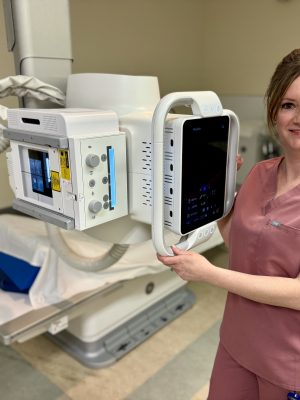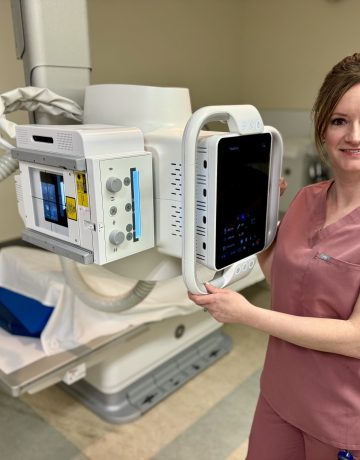Diabetes Educators at KDH Give People the Tools They Need to Live Well with Diabetes
To mark World Diabetes Day 2020, November 14, the Diabetes Education & Support Program at KDH would like to take the opportunity to raise awareness about the condition and explain their role in providing patients with the tools they need to live well with diabetes.

KDH’s Diabetes Dietitian Educator, Julia Hicks, leading a grocery store tour (pre-COVID) to provide shopping tips for people with diabetes or pre-diabetes.
Thanks to KDH’s Diabetes Dietitian Educator, Julia Hicks R.D., C.D.E., who prepared this article.
Today, more than 11 million Canadians are living with diabetes or pre-diabetes. As the number of people with diabetes continues to rise across the world, the role of nurses and other health professional support staff becomes increasingly important in managing the impact of the condition. People living with diabetes face numerous challenges, and diabetes educators may often be the first – and sometimes only – health professionals with whom a person interacts. As a result, the quality of their initial assessment, care and treatment is vital.
Diabetes is a chronic condition that occurs when the body cannot produce insulin, or when the insulin the body does produce cannot be used effectively. If left uncontrolled, diabetes results in consistently high blood sugar levels, which can cause damage to organs, blood vessels and nerves.
There are three main types of diabetes:
Type 2 Diabetes is the most common diagnosis and occurs when there is insufficient insulin production and/or insulin resistance. In some cases, Type 2 diabetes can be managed with healthy eating and regular exercise alone, but it may also require medications or insulin therapy. Roughly 90 percent of people living with diabetes have Type 2 diabetes.
Type 1 Diabetes is an autoimmune disease and is also known as insulin-dependent diabetes. People with Type 1 diabetes are unable to produce their own insulin because their body is attacking the pancreas. As a result, insulin injections or use of an insulin pump is required for people with Type 1 diabetes. Approximately 10 percent of people living with diabetes have Type 1 diabetes.
A third type of diabetes, known as Gestational Diabetes, occurs during pregnancy and is usually temporary. Between three and 20 percent of pregnant women develop gestational diabetes, depending on their risk factors. A diagnosis of gestational diabetes may increase the risk of developing diabetes later in life for both the mother and child.
In addition, Pre-diabetes is another important diagnosis; this is when blood sugar levels are higher than normal, but not yet high enough to be diagnosed as Type 2 diabetes. The progression of pre-diabetes to Type 2 diabetes can in some cases be prevented or delayed with healthy eating and regular exercise.
Upon diagnosis of diabetes, it is common for people to feel overwhelmed. They may wonder, what happens now? What foods can I eat? Will I need insulin or other medications? Am I at risk for other health problems? There is a lot of information out there, some reliable, and some not. Meeting with a diabetes educator – often a nurse or dietitian with specialized training – is the most effective way for people to get the support they need, including guidance on how to:
- develop healthy eating and activity goals;
- achieve and maintain a healthy weight;
- test your blood sugars;
- recognize the signs and symptoms of high or low blood sugars and what to do about it;
- take medications if required;
- monitor your eyes and feet to catch problems early, and
- reduce your risk of complications.
Here is some of the recent feedback from patients who have participated in the KDH Diabetes Education & Support Program:
“I am touched by the attention to details and the knowledge that you offered. It seems my biggest challenge will be exercise and nutrition. But I am committed to make changes to have an improved and more productive life.”
“Thank you for taking the time to talk with me today and for your email. I really appreciate the education you provided and how you made the information literally easy to ‘digest’.”
“Thank you for your dietary recommendations! With smart shopping and planning ahead I feel like I am able to enjoy my food and make healthy choices at the same time. I don’t feel like I am missing anything and I feel like my choices are sustainable long-term. Your support and kind words mean a lot!”
“Thank you for your guidance. I am actually looking forward to my next blood work as I think my doctor will be pleasantly surprised with my results!”
KDH’s Diabetes Education & Support Program is led by a Diabetes Dietitian Educator and a Diabetes Nurse Educator who take pride in providing patients with the tools they need to live well with diabetes.
As the COVID-19 pandemic continues, the KDH Diabetes Education & Support Program is available (virtually) for patients with pre-diabetes and diabetes who require assistance. The clinic is currently closed to outpatient visits; however, education can be provided via email or phone. Services are free and we accept both self-referrals and family doctor referrals. To inquire more about the KDH Diabetes Education & Support Program call 613-258-6133 extension 289.
99.7%
score on our last Accreditation Canada survey
Measuring the quality of care and services that KDH provides


